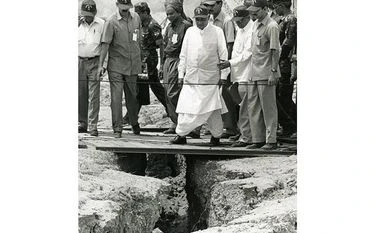Satta ka khel toh chalega,
Sarkarein aayengi… jaayengi…
Partiyaan banengi… bigadengi…
Magar ye desh rahna chahiye,
Is desh ka loktantra amar rahna chahiye…!
["The game of politics will be played endlessly, Governments will come, and perish…parties will be created and destroyed… But this nation must survive, and this nation’s democracy must live on…!]
These words of former prime minister Atal Bihari Vajpayee, spoken in the Lok Sabha in 1996 have been etched in public memory. One of independent India's tallest leaders, Vajpayee passed away on August 16, aged 93, at New Delhi’s All India Institute of Medical Sciences (AIIMS). In a political career spanning more than 47 years, Vajpayee was at the centre of several key moments in modern Indian history. From arriving at Parliament on a bullock cart to protest fuel price hike to representing the nation's interest at the United Nations as an opposition leader, Vajpayee has left behind a political legacy that few can rival.
Vajpayee served as the country’s prime minister thrice – first for 13 days, then 13 months, and finally four-and-a half years. As PM, he took India ahead into the future with some crucial reforms. Here are some of the most important developments during his tenure:
Pokhran II: Making India a nuclear power
Pokhran II was the most anxiously anticipated moment in the scientific history of India. It was during his tenure that India not only tested nuclear bombs successfully but also went unnoticed by US spy agencies while doing so. Scientists tested the nuclear fission and fusion bombs at Pokhran range and helped India realise its nuclear dream. Though the US imposed several sanctions on the country after the tests, India sailed through the difficult times without much difficulty.
Relations with Pak: Lahore Bus service
A bus service between New Delhi and Lahore was started by Atal Bihari Vajpayee, hoping to achieve peace with Pakistan. The bus service started in February 1999, but was stopped in the wake of the Kargil war. Despite the hurdles, the commitment to have better relations with neighbours was much appreciated by everyone.
Kargil War: Operation Vijay
In 1999, Pakistani army and militants crossed the line of control from the side of Pakistan-Occupied Kashmir, an event that snowballed into armed confrontation. The furore across the nation was huge, but Vajpayee stood like a rock and led with strength. He famously said: “Pakistan has fired the first bullet, India will fire the last.” In a war fought in the world's highest battlefield, Vajpayee's firm determination boosted the morale and India regained every inch of land Pakistan had captured. Today, July 26 in India is celebrated as Kargil Vijay Diwas every year.
One regrettable incident: IC 814 hijack
In yet another unprecedented turn of events inside the first year of Vajpayee's tenure, Air India flight IC 814 carrying 176 passengers was hijacked by the terrorist group Harkat-ul Mujahideen. They demanded the release of several militants, including Maulana Masood Azhar. After days of negotiations, India released Masood Azhar and two other terrorists to secure the safe release of the passengers. The drama unfolded across countries like Nepal, Pakistan, UAE and Afghanistan, and lasted eight days.
Literate India: Sarva Shiksha Abhiyaan
Amid turbulences created by the IC 814 hijacking incident and the Kargil war, Vajpayee did not lose his focus from his other responsibilities. His government launched the Sarva Shiksha Abhiyaan. The idea was to eradicate illiteracy from the country. 'Each one, teach one' was the motto of this educational drive. Vajpayee himself wrote the famous poem 'School chale hum', which was used as the promotional song for the campaign.
Road connectivity: Golden quadrilateral and National Highways Development Project
Vajpayee's vision for development was very realistic. He initiated the Golden Quadrilateral, connecting major cities of India. Also, he pushed the speedy development of national highways under the National Highways Development Project. To fund these multi-billion-rupee projects, he introduced a Re 1 cess on petrol and all the fund thus raised went to NHDP.
Withstanding terror: The Parliament attack
On December 13, 2001, the Indian Parliament was attacked by five heavily armed Lashkar-e-Toiba and Jaish-e-Mohammed terrorists. Vajpayee had just left the Parliament House when the terrorists launched the attack. The operation saw 11 security personnel losing their lives, but all terrorists were also neutralised. The attack was telecast live on news channels and the incident put the brakes on Indo-Pak peace talks.
Prevention of Terrorism Act, 2002 (POTA)
Following the Parliament attack, IC 814 hijack, and other terror activities, the Government of India under Vajpayee's leadership brought the Prevention of Terrorism Act, 2002 (POTA). The Act defined terrorism and terror activities and gave special powers to investigating authorities.
Communication boom: Boost to the telecom industry
Vajpayee introduced a revolutionary policy to replace the fixed licence fees for telecom firms with a revenue-sharing arrangement. The Telecom Dispute Settlement Appellate Tribunal (TDSAT) was set up and the monopoly of Videsh Sanchar Nigam Limited (VSNL) on international calls was ended.
Economics: Fiscal Responsibility and Budget Management Act, 2003
The objective of the Fiscal Responsibility and Budget Management Act was to reduce the revenue deficit. It aimed at introducing transparent fiscal management systems in the country and bring a more equitable and manageable distribution of the country's debts over the years.
Unlock 30+ premium stories daily hand-picked by our editors, across devices on browser and app.
Pick your 5 favourite companies, get a daily email with all news updates on them.
Full access to our intuitive epaper - clip, save, share articles from any device; newspaper archives from 2006.
Preferential invites to Business Standard events.
Curated newsletters on markets, personal finance, policy & politics, start-ups, technology, and more.
)